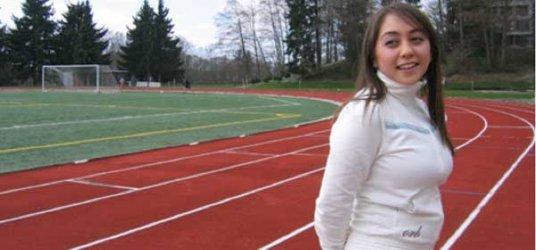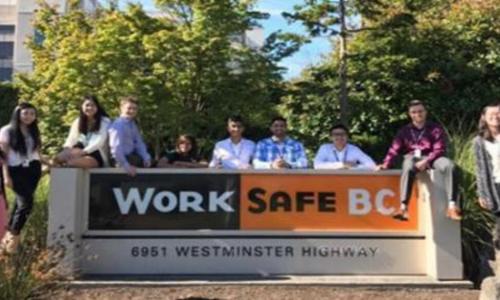
Samantha Garcia graduated this past June with a Bachelors of Science in Kinesiology, with a Co-op designation for her four Co-op work terms. By participating in the Co-op program, Samantha has been able to work at three diverse placements, allowing her to gain experience in the private and public sectors of her intended career path. Her first two work terms were at Arbutus Manor, a senior’s retirement community owned by Amaca Inc. Her second term was at Fit City for Women, a ladies-only gym, and her final term was at LifeMark Health Inc., a private Canadian physiotherapeutic company.
Samantha spent her first two Co-op terms at Arbutus Manor as a fitness coordinator. Here, she managed five fitness programs a week for the community’s residents, along with two walking groups. She also coordinated trips to various locations to take the residents to, such as the beach or a nearby park. “They are an opportunity for the residents to get out in the community, as well as sneak in a bit of exercise with all the walking we do,” she says. Samantha’s biggest learning curve while working at Arbutus Manor was learning to communicate with seniors, as it required a great deal of patience and understanding.
At Fit City for Women, Samantha was a trainer and receptionist. The working environment was quite fast paced, as she would often meet with new clients and help them train within the same appointment. “It was a learn-as-you-go environment,” Samantha recalls. “It required a lot of quick thinking.”
At LifeMark Health Inc., Samantha worked as a kinesiologist providing exercise therapy treatments for clients, most of whom were suffering from work-related injuries. Here she led daily activities, helping clients recover in a group setting. “This was my most memorable work term placement,” she notes. “This was my first time working with injured people, and that helped me understand just how long the recovery process can be, physically and mentally. I was glad to be trusted and respected by the patients, who treated me like a clinician, not a student.” By working at LifeMark, Samantha was exposed to the ins and outs of the Workers Compensation Board (WCB), which is a big sector for kinesiologists.
In the end, Samantha was able to come out of the Co-op program with a competitive edge, along with a more focused idea of what she would like to do in the future. “A few years ago, I had no idea what I wanted to do after I finished my degree. Now, I feel completely confident as I graduate,” she says. Not only was Samantha able to make many great contacts through Co-op, she was also able to pay for most of her degree through the program, while her part-time employment paid for the rest.
For Samantha, the most valuable benefit from participating in the Co-op program was the chance to develop professionally. “I had great resources at my disposal and Co-op advisors are always there when you need guidance.” She says. “Since there are not very many courses offered on rehabilitation, I was able to learn more about these areas while on the job.”
In early July, Samantha accepted a position at SFU as Recreation Coordinator for Fitness. In the future she intends to find work in a clinical setting and may pursue a physiotherapy masters degree.
“Co-op was such a great experience,” She says. “I wish more students would look beyond the fact that it takes extra time and money, because the experiences gained from it are totally worth it.”














